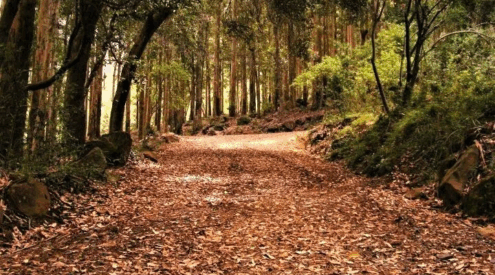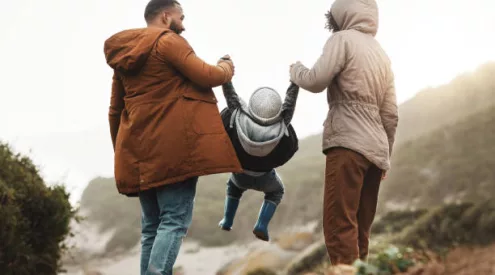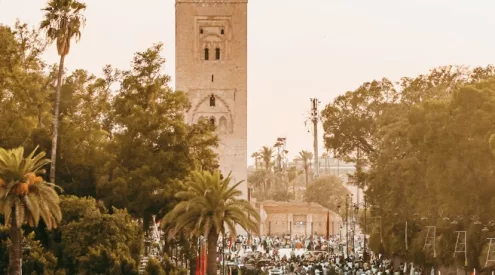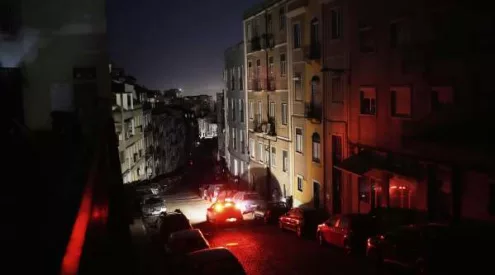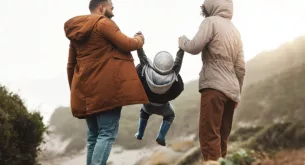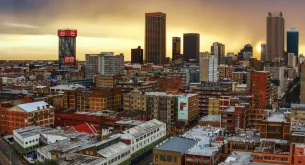President Cyril Ramaphosa addressed the nation about South Africa’s plan to tackle the spread of COVID-19 during the second wave of infections on Monday, January 11.
Ramaphosa announced that the adjusted Lockdown Level 3 restrictions, which included a number of stringent regulations, and a stricter curfew, will remain in place. The banning of social gatherings and the sale and distribution of alcohol will also be maintained.
The curfew will now be in place from 9pm until 5am.
The 20 South African land borders that are currently open will be closed until February 15, including the six busiest land borders such as Beitbridge and Maseru bridge.
President #Ramaphosa: To reduce congestion and the high risk of transmission, Cabinet has decided that the 20 land ports of entry that are currently open will be closed until the 15th of February for general entry and departure. pic.twitter.com/bC7nZMRnms
— Presidency | South Africa 🇿🇦 (@PresidencyZA) January 11, 2021
Ramaphosa said congestion at border posts and the high number of people arriving without proof of a negative COVID-19 test were the motivation behind this decision.
Cross-border travel will still be allowed under certain conditions, including transportation of fuel, cargo and goods, medical reasons, the return of South African citizens and diplomats, the departure of foreign nationals and daily commuters into the country, such as people who travel to school.
The full list of exemptions will be contained in the regulations.
All beaches, dams, lakes, rivers, public parks and public swimming pools in hotspot areas will remain closed to the public.
Botanical gardens with sufficient access control, such as SANParks-operated facilities will remain operational during the adjusted lockdown period and all hiking and cycling trails, will remain open to the public, as long as they have the relevant permits for activities.
The president said South Africa has recorded 100,000 new infections since New Year’s Day, saying, ‘the virus is now at its most devastating.’ The country’s death toll has surpassed 33,000.
Ramaphosa once again citizens cautioned against attending funerals, as they have been consistently identified as superspreader events. Many of the people who are dying now were infected at funerals, according to Ramaphosa.
‘Let us pay heed to this,’ he said. ‘ Funerals have become a death trap for our people.’
Read President Cyril Ramaphosa’s full speech below:
Fellow South Africans,
We are now 11 days into a new year.
Once again, I wish you all the very best for 2021.
We enter this year with a great deal of hope – hope that we will restore our nation to health, that the new year will bring our people relief and comfort, and that lives and livelihoods will be rebuilt.
But, if we are to realise our aspirations for the year, we must unite to overcome the grave, persistent and deepening coronavirus pandemic.
The pandemic in our country is now at its most devastating.
The number of new infections, hospital admissions and deaths is higher now than it has ever been since the first case was recorded in our country in March 2020.
Since New Year’s Day, we have recorded nearly 190,000 new coronavirus infections.
The country has recorded more than 4,600 COVID-19 deaths so far this year.
Since the start of the pandemic, South Africa has recorded a cumulative number of more than 1.2 million COVID-19 cases.
We have recorded more than 33,000 deaths and more than 148,000 people have been admitted to hospital.
As a proportion of the population, the province with the highest average number of cases over the last seven days is KwaZulu-Natal, followed by Western Cape, Gauteng, Limpopo and Mpumalanga.
New infections in KwaZulu-Natal and the Western Cape have grown fast and have now far exceeded the peak during the first wave.
Infections in Gauteng are growing exponentially and are expected to increase further as more residents of Gauteng return to the province following the festive break.
However, we are encouraged that the rate of new infections in the Eastern Cape, while still high, is lower now than they were in the middle of December.
In several parts of the country, hospital admissions are also much higher now than during the first wave.
There are currently over 15,000 people with COVID-19 in hospitals nationally, placing a considerable strain on health facilities, personnel and equipment.
Around a third of all COVID-19 patients in hospitals are on oxygen.
Therefore, there is an intensive focus in our health facilities on increasing oxygen supply and activating field hospital beds.
Additional posts that were vacant are being filled, and personal protective equipment stocks are being jointly monitored with the Office of Health Standards Compliance.
Research undertaken by our scientists has shown that the massive increase in infections is largely driven by a variant of the coronavirus known as 501.v2.
This variant was first identified in South Africa in November.
We do know that this new variant of the virus spreads much faster than the earlier variants.
This explains the fact that many more people have become infected in a far shorter space of time.
Emerging information suggests that this new variant does not cause more severe illness than the original variants.
But it does put more pressure on the health system because the cases increase so rapidly and the hospitals get full more quickly.
But one of the most important things that we know about the new variant is that we can prevent transmission using exactly the same measures that we have been using to protect ourselves and others all along.
We must remember that this virus is carried through the air.
We must therefore avoid what has been described as the three Cs – closed spaces, crowded places and close contact with others.
Because the new variant can infect people more easily, it is vital that we each become even more cautious about the places we go to and the number of people with whom we interact.
We must not let up on any of the health protocols we have been observing.
If anything, the new variant means that we must be more diligent, more compliant and more consistent in following the necessary health guidelines.
Fellow South Africans,
Despite the severity of the pandemic in our country, we are not helpless.
As we have shown over the last 10 months, our actions do have an impact on the direction and the extent of the disease.
We have shown that when we work together, we can make a difference.
As we begin this new year, let us therefore set out a clear path to recovery.
Let us agree on what it is that we must do – and will do – to overcome this pandemic during the course of 2021.
Firstly, we must do everything possible to slow the rate of transmission and, as we have done before, flatten the curve of infection.
Secondly, we will undertake a massive programme of vaccination so that we can achieve immunity across our population and thereby slow the spread of the virus.
If we focus on these two overriding tasks, if we act with both urgency and purpose, we will be able to prevent many more infections, save many lives, rebuild our economy and ultimately overcome this disease.
On the first task – to slow the rate of transmission – we have all the tools we need.
We know what we need to do as individuals, as families, as companies, as communities.
I am greatly encouraged by how people have responded to the call to wear masks whenever in a public place, as we know this is one of the best ways to prevent transmission of the virus.
I wish to thank all those South Africans who now wear masks without fail.
Now more than ever, we must each make a deliberate decision to avoid any unnecessary contact with other people.
I would like to take a moment to specifically address the issue of funerals, which have consistently been identified as so-called ‘super spreader’ moments.
Providing a fitting send-off for a departed loved one is deeply ingrained in all of us.
There are certain rituals that we perform in line with our respective cultures and traditions; not just at the funeral itself but in the days leading up to the burial.
But these are all things we simply cannot do at this time.
We are in the grip of a deadly pandemic and all these activities that would normally take place are just increasing our exposure to risk – for ourselves, for the bereaved family and for our own families at home.
There will be a time when we can go to the home of the deceased to pay our respects, and to sympathise properly with our neighbours, friends and relatives.
But for now, it is best and safer to stay at home.
Fellow South Africans,
On the 28th of December 2020, we announced that South Africa was being placed on adjusted Alert Level 3 to contain the rapid rise in infections.
We also announced that several areas in Eastern Cape, Western Cape, KwaZulu-Natal, Gauteng, Limpopo and North West were declared as hotspot areas.
We have now had an opportunity to review the measures that were put in place as part of adjusted alert level 3 in light of the current state of the pandemic.
We have also held consultations with religious leaders, community-based organisations, business, labour and representatives of provincial and local government and traditional leadership on the impact of these measures.
Based on the recommendations of the National Coronavirus Command Council, Cabinet has decided to maintain the country on adjusted alert level 3.
Most of the measures that were announced on 28 December 2020 will therefore remain in place.
– Given the risk of widespread transmission, most indoor and outdoor gatherings will not be permitted. This includes social gatherings, religious gatherings, political events, traditional council meetings and gatherings at sports grounds.
As before, this does not include funerals and other limited exceptions as detailed in the regulations, such as restaurants, museums and gyms.
– Funerals may not be attended by more than 50 people, and there needs to be social distancing, hand sanitising and mask wearing.
– The hours of curfew will now start at 9pm and end earlier, at 5am.
– It remains compulsory for every person to wear a mask in a public space.
– The sale of alcohol from retail outlets and the on-site consumption of alcohol is still not be permitted.
Health services in several parts of the country reported that the prohibition of alcohol sales had significantly reduced the number of trauma cases seen in our hospitals over the New Year period.
It is vital that we continue to protect our health services at this crucial time.
– All beaches, dams, lakes, rivers, public parks and public swimming pools in hotspot areas will be closed to the public. As before, botanical gardens, national parks and other parks where access control measures and entry limitations are already in place may remain open to the public.
One of the challenges that we have as the festive season draws to a close is the huge congestion at many of our land border posts.
This has exposed many people to infection as they wait to be processed and it has been difficult to ensure that the health requirements for entry into South Africa are met, with many people arriving without proof of COVID-19 tests.
To reduce congestion and the high risk of transmission, Cabinet has decided that the 20 land ports of entry that are currently open will be closed until the 15th of February for general entry and departure.
These include the six busiest border posts, which are Beitbridge, Lebombo, Maseru Bridge, Oshoek, Ficksburg and Kopfontein.
People will be however still be allowed to enter or depart the country for:
– the transportation of fuel, cargo and goods,
– emergency medical attention for a life-threatening condition,
– the return of South African nationals, permanent residents or persons with other valid visas,
– diplomats,
– the departure of foreign nationals,
– daily commuters from neighbouring countries who attend school in South Africa.
The full list of exemptions will be contained in the regulations.
It is necessary that we keep the Alert Level 3 measures in place until we have passed the peak of new infections and we are certain that the rate of transmission has fallen enough to allow us to safely ease the current restrictions.
I wish to express my appreciation to the religious community in particular for its support and understanding throughout this pandemic.
Not only have faith-based organisations had to limit or adjust the nature of worship and other activities, they have also provided counselling, support, feeding schemes and other social services to communities.
At a time when people need both material and spiritual comfort, it is indeed unfortunate that the restrictions on religious and other gatherings have to remain.
Research has identified several risks that arise from religious services and other gatherings. These include the risks associated with enclosed spaces, large groups, close proximity to others, staying for a long time in one place, and loud talking and singing.
We will continue our discussions with religious leaders on how best to safely meet the desire of many our people to worship in congregation while working together to preserve life.
As schools and other educational institutions prepare to begin the new academic year, there is understandably concern about whether this is advisable in the midst of a second wave of infections.
The National Coronavirus Command Council is dealing with this issue, and we will provide guidance on this matter in the coming days.
As the country returns to work after the festive break, it is essential that all places of work ensure that they continue to have safety protocols in place and that these are rigorously adhered to.
Our second task as we chart our path to recovery is to achieve immunity across our population through a massive programme of vaccination.
The development of several effective vaccines is the most significant and most promising advance since the onset of the global pandemic.
We have always said that an effective vaccine will be a game-changer.
Vaccines offer to the peoples of the world a means to control the coronavirus pandemic.
A person who is vaccinated has a much reduced chance of becoming ill and dying from COVID-19.
When enough people are vaccinated, we will reach what is known as ‘herd immunity’ or ‘population immunity’.
This is when enough of the population is immune to the virus to provide indirect protection to those who aren’t immune, bringing the spread of the virus under control.
While the actual level needed for herd immunity is not known, our scientists estimate that we will likely reach herd immunity once around 67 per cent of our population are immune.
This amounts to around 40 million people in South Africa.
We have put in place a comprehensive vaccination strategy to reach all parts of the country.
This will be the largest and most complex logistical undertaking in our country’s history.
It will be far more extensive than our HIV treatment programme or even our national, provincial and local elections in terms of the number of people who have to be reached within a short space of time.
It will require the active involvement of all spheres of government, all sectors of society and all citizens and residents of our country.
Our strategy has several parts.
The first part of our strategy is to acquire enough vaccine doses to reach herd immunity.
We are in the process of procuring vaccines through three channels: through the World Health Organization’s COVAX facility, through the African Union’s vaccine initiative and through direct engagements with vaccine manufacturers.
As I have reported before, South Africa is part of the global COVAX facility, in which countries pool their resources to support the development of vaccines with a view to ensure that all countries receive an equitable supply of effective vaccines.
We will receive vaccine doses for around 10 per cent of our population through COVAX.
As the chair of the African Union, we initiated the establishment of an African Vaccine Acquisition Task Team to source vaccine doses for the continent. These will be purchased in bulk and African countries will be able to order vaccine doses from this pool.
It is estimated that Africa as a whole will need 1.5 billion doses to immunise the target of 60 per cent of its population.
Through intensive engagement with vaccine manufacturers, the Task Team has done tremendous work to secure vaccine does for countries on the continent.
The South African government has also been engaging directly with several vaccine manufacturers for over six months.
Given the massive global demand for vaccines and the vastly greater purchasing power of wealthier countries, we are exploring all avenues to get as many vaccine doses as soon as possible.
While there are several promising negotiations with a number of different manufacturers that still need to be concluded, we have to date secured 20 million doses to be delivered mainly in the first half of the year.
We will make further announcements as we conclude our negotiations with vaccine manufacturers.
The second part of our strategy is to identify the priority groups that need to be vaccinated as we receive vaccine doses throughout the year.
In Phase 1, with the first batch of vaccines, we will prioritise around 1.2 million front line health workers.
In Phase 2, when more vaccines arrive, we will prioritise essential workers such as teachers, police, municipal workers and other frontline personnel. We will also prioritise people in institutions like old age homes, shelters and prisons, people over 60 years of age and adults with co-morbidities. The total number we plan to reach in this phase is around 16 million people.
In Phase 3, with increased manufacturer supplies, we will then vaccinate the remaining adult population of approximately 22.5 million people.
We will then have reached around 40 million South Africans, which is considered to approximate herd immunity.
The third part of our strategy is to distribute the vaccines throughout the country and to administer them to those who have been identified to receive them.
We have established a national coordinating committee, which brings together key government departments, the private sector and other stakeholders to oversee the implementation of our national strategy.
We will administer vaccinations through hospitals, clinics, outreach services and mobile clinics, and private settings such as doctor’s offices, pharmacies and work places.
We have had several engagements with stakeholders in recent weeks to ensure a coordinated and inclusive vaccination campaign.
An inclusive partnership has been formed between government, medical schemes and the private sector to support the acquisition, funding and distribution of vaccines.
We see a vital role for organised labour, traditional leaders and the religious community in the dissemination of accurate information on vaccines and in ensuring optimal participation in the vaccine programme.
We welcome the contributions made by civil society, academics and others towards the development of an effective national strategy, even when such contributions have been critical of government.
We are integrating the full resources and capacity of our country into a single effort directed at making vaccines available.
This collaboration, which is among the most significant of its kind in our history, is essential as we work to gather in solidarity to win the war against COVID-19.
There are still some in our country who are sceptical about vaccines, and there is much disinformation and conspiracy theories being spread about the COVID-19 vaccines.
Yet vaccines have been used to eradicate diseases such as small pox and polio. Children get vaccinated routinely against many diseases such as mumps, measles rubella, and travellers are often vaccinated against diseases like yellow fever.
Every vaccine that will be used in our programme will have to be approved by the South African Health Products Regulatory Authority, which applies stringent scientific standards to ensure the safety and efficacy of any drug or treatment.
South Africa’s vaccine strategy is well underway.
Understandably, we all want to know when the vaccines will be arriving.
As we work to secure the supply of sufficient doses in the midst of a huge global demand, we will do everything possible to ensure that the process is transparent and that all information is available.
I call on all South Africans to be part of the monumental undertaking to roll-out the coronavirus vaccine.
Although it will be difficult, complex and often frustrating, it is vital that we do this together, for the sake of our country and for the well-being of all our people.
As we travel together along the path to overcome the coronavirus pandemic, we must never lose sight of the need to act urgently and decisively to end the violence that men perpetrate against women and children.
Gender-based violence and femicide is our country’s second pandemic.
Plans to implement social and behavioural change interventions are take shaping.
For example, government has been collaborating with several civil society formations to sensitise taxi drivers and taxi marshals on gender awareness, gender norms, toxic masculinity and GBVF in an effort to change behaviour.
In another example, faith-based organisations have initiated a campaign to sensitise religious leaders on patriarchy, gender-based violence and the church. This includes a programme where leaders are trained to accompany survivors of gender-based violence from the time they report the incident until they are referred for further service. Faith activists are also trained to support women through the court process.
Efforts are underway to support women’s economic empowerment especially during this period of COVID-19. This includes training for business women to enable them to access public procurement opportunities.
To end harassment at work, South Africa is in the process of ratifying ILO Convention 190, which establishes a global standard for protection of women and other vulnerable groups in the world of work.
Fellow South Africans,
Nearly half a year has passed since I spoke to you about the coronavirus storm that was sweeping across our nation.
I said that the coronavirus storm is far fiercer and more destructive than any we have known before.
We are now in the centre of the storm.
We do not know how much longer it will last or how much worse it will get.
But we know what we need to do to weather the storm.
We know what we need to do to protect ourselves and those around us.
We know what we need to do – as a nation, as a continent and as a global community – to overcome this pandemic.
We need to act with a common purpose, understanding that what we each do is important for ourselves, our families, our communities and our society.
If we work together as we have done over these many months, if we maintain our resolve, we will realise the new year that we all so dearly hope for.
We will find the peace, comfort, relief and good health that we all seek.
We will rebuild our lives and our nation.
May God continue to bless South Africa and protect her people.
I thank you.
Picture: Getaway Gallery

